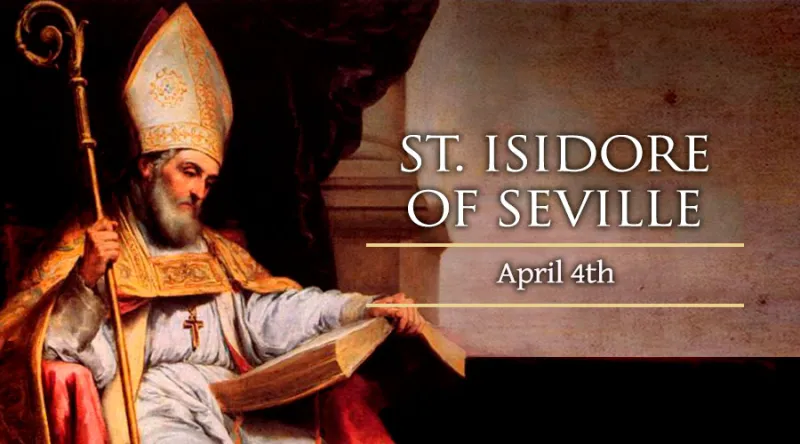St. Isidore of Seville

St. Isidore of Seville
Feast date: Apr 04
On April 4, the Catholic Church honors Saint Isidore of Seville, a bishop and scholar who helped the Church preserve its own traditions, and the heritage of western civilization, in the early middle ages.
In 653, less than two decades after his death, a council of bishops in Spain acclaimed St. Isidore as “an illustrious teacher of our time and the glory of the Catholic Church.” He is regarded as being among the last of the early Church Fathers, who combined Christian faith and classical education.
Isidore was born in Cartagena, Spain, in approximately 560. Three of his siblings – his brothers Leander and Fulgentius, who became bishops, and his sister Florentina, a nun – were later canonized as saints along with him.
As the Archbishop of Seville, Leander was an important influence on his younger brother, helping Isidore develop a commitment to study, prayer, and intense work for the good of the Church. Isidore, in turn, joined his brother’s mission to convert the generally heretical Visigoths who had invaded Spain.
When St. Leander died around the year 600, his brother succeeded him as Seville’s archbishop. Isidore inherited his brother’s responsibility for Church affairs in an intense period of change, as the institutions of the Western Roman Empire gave way to the culture of the barbarian tribes.
For the good of the Church and civilization, Isidore was determined to preserve the wisdom and knowledge of the past, maintaining the fruitful synthesis of classical Roman culture and Christian faith. He was also intent on preventing false teachings from shattering the unity of the Church in Spain.
Responsible above all for the good of the Church, Isidore also sought the common good by encouraging study and development in areas such as law, medicine, foreign languages, and philosophy. He compiled the “Etymologiae,” the first encyclopedia written from a Catholic perspective.
Under Isidore’s leadership, a series of local councils solidified the orthodoxy of the Spanish Church against errors about Christ and the Trinity. Systematic and extensive education of the clergy was stressed as a necessary means of guarding the faithful against false doctrine.
Prolific in his writings and and diligent in governing the Church, Isidore did not neglect the service of those in need.
“Indeed, just as we must love God in contemplation, so we must love our neighbor with action,” he declared. “It is therefore impossible to live without the presence of both the one and the other form of life, nor can we live without experiencing both the one and the other.”
In the last months of his life, the Isidore offered a moving testament to these words, intensifying his charitable outreach to the poor. Crowds of people in need flocked to his residence from far and wide, as the bishop offered his final works of mercy on earth.
St. Isidore of Seville died on April 4 of the year 636. Later named a Doctor of the Church, he was more recently proposed as a patron saint of Internet users, because of his determination to use the world’s accumulated knowledge for the service of God’s glory.
